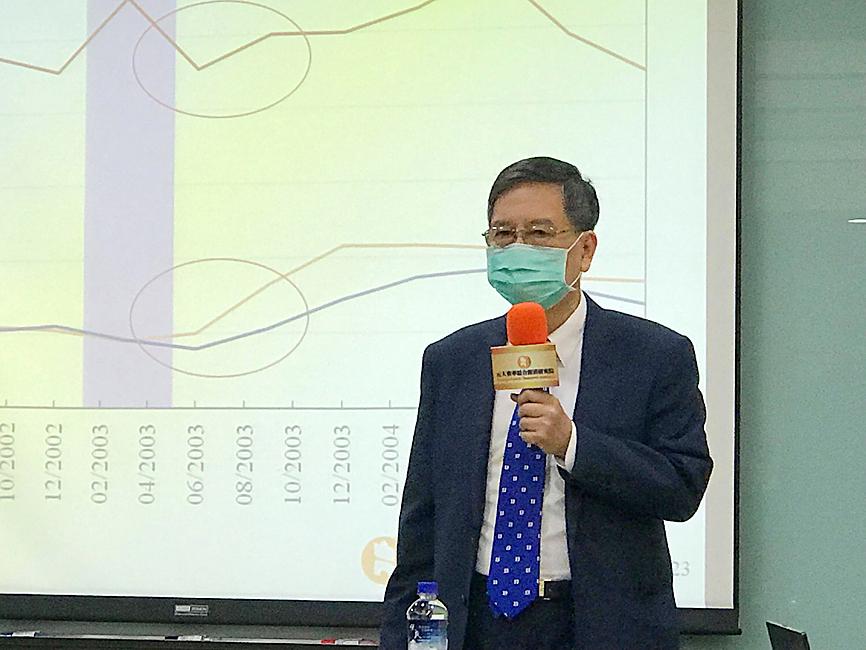The Yuanta-Polaris Research Institute (元大寶華綜經院) yesterday cut its forecast for Taiwan’s GDP growth this year from 2.3 percent to 1.5 percent as the COVID-19 pandemic deals a blow to the global economy with no signs of easing anytime soon.
“The damage caused by COVID-19 is evolving beyond the depths of existing economic models, because health experts around the world do not have a full grasp of the disease yet,” said Liang Kuo-yuan (梁國源), the Taipei-based think tank’s president.
Research institutes at home and abroad are comparing the pandemic to the SARS outbreak of 2003 or the global financial crisis of 2008, but there is no guarantee that the analogies are valid or sound, Liang said.

Photo: Wu Chia-ying, Taipei Times
However, the one thing that is certain is that the virus is quickly sweeping from Asia to Europe, the US and other parts of the world, dimming global trade outlook and chilling consumer activity, he said.
The pandemic encompasses all of Taiwan’s export markets and there is no doubt that exports would take a hit beyond the earlier concerns caused by supply chain disruptions in China, he added.
Diminished market demand has become a reality following travel restrictions and business shutdowns around the world, and a recovery is evasive until the third quarter of this year or beyond, Liang said.
A protracted outbreak would suggest massive business closures and unemployment, he added.
“The chance of a V-shape recovery is as low as a full-blown recession for the time being,” he said, adding that the world is treading a tightrope and the outcome hinges on how fast it can contain the virus.
The think tank’s forecast is lower than the central bank’s 1.98 percent projection last week and the 2.3 percent growth the Directorate-General of Budget, Accounting and Statistics predicted last month.
However, the latter’s forecast came before the virus had spread to Europe and the US, Liang said.
Government expenditure is the only GDP component that would gain momentum amid efforts to shore up struggling companies, he said.
Private investment would hold resilient as firms continue to move production away from China and balance investment risks, he added.
Exports this year are now expected to increase only 1.27 percent, while imports might grow mildly at 1.3 percent, the institute said.
Private consumption might squeeze out a 1.04 percent increase as people cut spending, while the government seeks to lend support, it said.
The decline in oil prices is the only favorable development, which would allow Taiwan to post trade surpluses, Liang said.
The New Taiwan dollar might trade at an average of NT$30.36 against the greenback as the central bank maneuvers to support exports while seeking to avert currency manipulation charges by the US, Liang said.

South Korea’s equity benchmark yesterday crossed a new milestone just a month after surpassing the once-unthinkable 5,000 mark as surging global memory demand powers the country’s biggest chipmakers. The KOSPI advanced as much as 2.6 percent to a record 6,123, with Samsung Electronics Co and SK Hynix Inc each gaining more than 2 percent. With the benchmark now up 45 percent this year, South Korea’s stock market capitalization has also moved past France’s, following last month’s overtaking of Germany’s. Long overlooked by foreign funds, despite being undervalued, South Korean stocks have now emerged as clear winners in the global market. The so-called “artificial intelligence

‘SEISMIC SHIFT’: The researcher forecast there would be about 1.1 billion mobile shipments this year, down from 1.26 billion the prior year and erasing years of gains The global smartphone market is expected to contract 12.9 percent this year due to the unprecedented memorychip shortage, marking “a crisis like no other,” researcher International Data Corp (IDC) said. The new forecast, a dramatic revision down from earlier estimates, gives the latest accounting of the ongoing memory crunch that is affecting every corner of the electronics industry. The demand for advanced memory to power artificial intelligence (AI) tasks has drained global supply until well into next year and jeopardizes the business model of many smartphone makers. IDC forecast about 1.1 billion mobile shipments this year, down from 1.26 billion the prior

NEW IDENTITY: Known for its software, India has expanded into hardware, with its semiconductor industry growing from US$38bn in 2023 to US$45bn to US$50bn India on Saturday inaugurated its first semiconductor assembly and test facility, a milestone in the government’s push to reduce dependence on foreign chipmakers and stake a claim in a sector dominated by China. Indian Prime Minister Narendra Modi opened US firm Micron Technology Inc’s semiconductor assembly, test and packaging unit in his home state of Gujarat, hailing the “dawn of a new era” for India’s technology ambitions. “When young Indians look back in the future, they will see this decade as the turning point in our tech future,” Modi told the event, which was broadcast on his YouTube channel. The plant would convert

People stand in a Pokemon store in Tokyo on Thursday. One of the world highest-grossing franchises is celebrated its 30th anniversary yesterday.